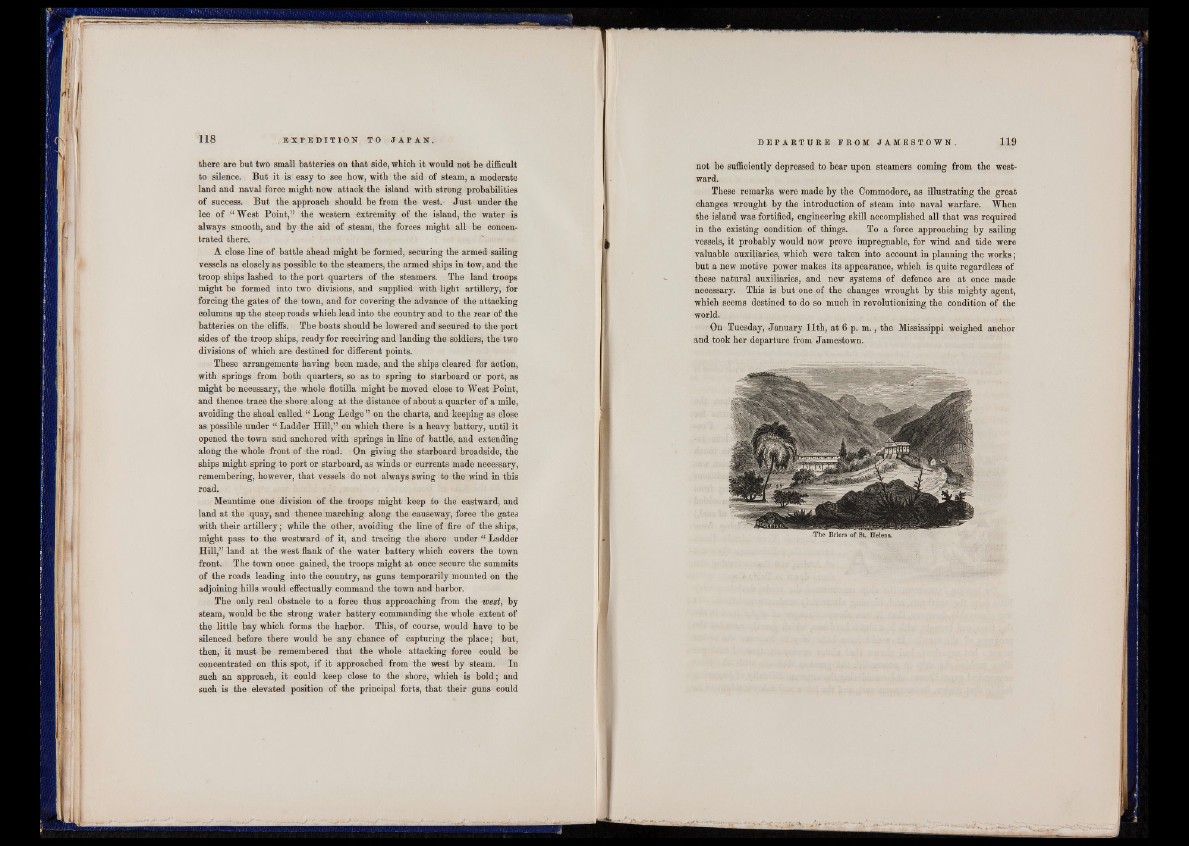
there are but two small batteries on that side, which it would not be difficult
to silence. But it is easy to see how, with the aid of steam, a moderate
land and naval force might now attack the island with strong probabilities
of success. But the approach should be from the west. Just under the
lee of “West Point,” the western extremity of the island, the water is
always smooth, and by the aid of steam, the forces might all be concentrated
there.
A close line of battle ahead might be formed, securing the armed sailing
vessels as closely as possible to the steamers, the armed ships in tow, and the
troop ships lashed to the port quarters of the steamers. The land troops
might be formed into two divisions, and supplied with light artillery, for
forcing the gates of the town, and for covering the advance of the attacking
columns up the steep roads which lead into the country and to the rear of the
batteries on the cliffs. The boats should be lowered and secured to the port
sides of the troop ships, ready for receiving and landing the soldiers, the two
divisions of which are destined for different points.
These arrangements having been made, and the ships cleared for action,
with springs from both quarters, so as to spring to starboard or port, as
might be necessary, the whole flotilla might be moved close to West Point,
and thence trace the shore along at the distance of about a quarter of a mile,
avoiding the shoal called “ Long Ledge ” on the charts, and keeping as close
as possible under “ Ladder Hill,” on which there is a heavy battery, until it
opened the town and anchored with springs in line of battle, and extending
along the whole front of the road. On giving the starboard broadside, the
ships might spring to port or starboard, as winds or currents made necessary,
remembering, however, that vessels do not always swing to the wind in this
road.M
eantime one division of the troops might keep to the eastward, and
land at the quay, and thence marching along the causeway, force the gates
with their artillery; while the other, avoiding the line of fire of the ships,
might pass to the westward of it, and tracing the shore under “ Ladder
Hill,” land at the west flank of the water battery which covers the town
front. The town once gained, the troops might at once secure the summits
of the roads leading into the country, as guns temporarily mounted on the
adjoining hills would effectually command the town and harbor.
The only real obstacle to a force thus approaching from the west, by
steam, would be the strong water battery commanding the whole extent of
the little bay which forms the harbor. This, of course, would have to be
silenced before there would be any chance of capturing the place; but,
then, it must be remembered that the whole attacking force could be
concentrated on this spot, if it approached from the west by steam. In
such an approach, it could keep close to the shore, which is bold; and
such is the elevated position of the principal forts, that their guns could
not be sufficiently depressed to bear upon steamers coming from the westward.
These remarks were made by the Commodore, as illustrating the great
changes wrought by the introduction of steam into naval warfare. When
the island was fortified, engineering skill accomplished all that was required
in the existing condition of things. To a force approaching by sailing
vessels, it probably would now prove impregnable, for wind and tide were
valuable auxiliaries, which were taken into account in planning the works;
but a new motive power makes its appearance, which is quite regardless of
these natural auxiliaries, and new systems of defence are at once made
necessary. This is but one of the changes wrought by this mighty agent,
which seems destined to do so much in revolutionizing the condition of the
world.
On Tuesday, January 11th, at 6 p. m ., the Mississippi weighed anchor
and took her departure from Jamestown.
The Briers of S t Helena.